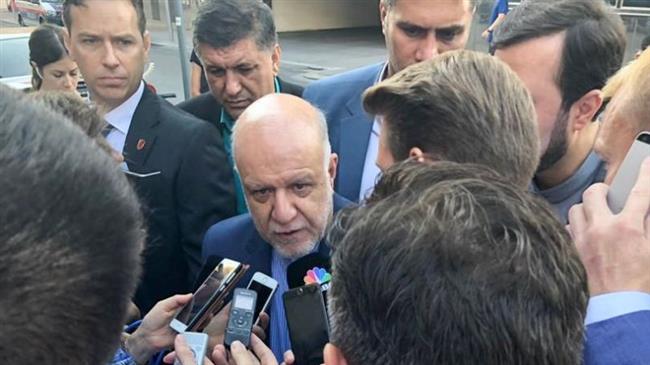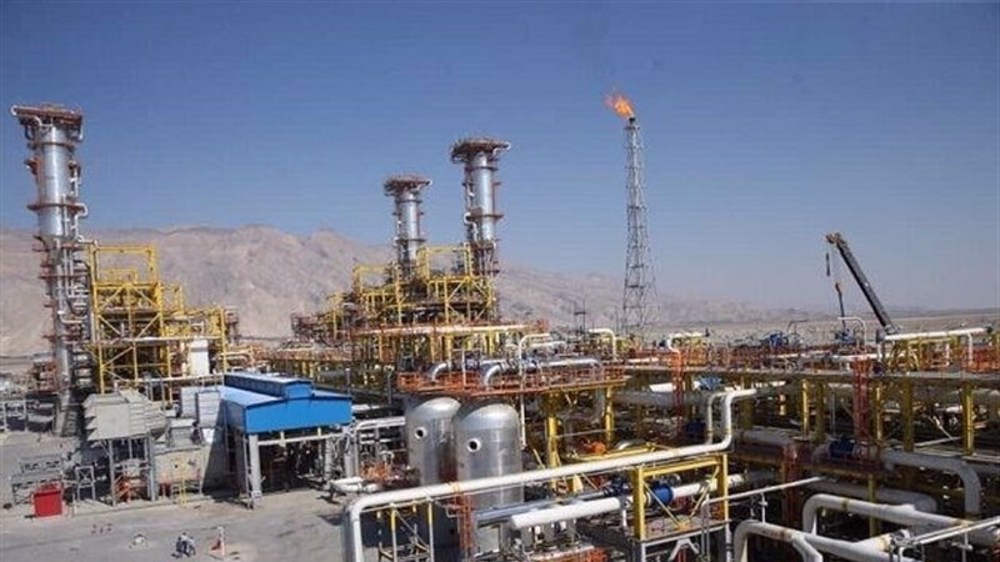Some OPEC members threaten organization’s existence: Iran
Iran's minister of petroleum says some members of the Organization of the Petroleum Exporting Countries (OPEC) risk destroying the energy group, in an apparent dig at Saudi Arabia.
Bijan Zangeneh said Monday Tehran backs cooperation with non-OPEC oil producers, but stressed the importance of achieving unity among the organization’s members in the first place.
"Without unity among members of OPEC, it is meaningless to plan cooperation between OPEC and non-OPEC countries,” he told reporters before heading to Vienna to attend an OPEC meeting.
OPEC members were to meet later on Monday followed by a meeting with non-OPEC states, including Russia, on Tuesday.
They are expected to prolong the current output restrictions of 1.2 million barrels per day (bpd) by another six to nine months, with Zangeneh saying Iran will support the decision.
Tehran has in the past objected to policies put forward by Saudi Arabia, saying Riyadh was too close to Washington.
The United States is not a member of OPEC, but it has demanded Saudi Arabia pump more oil to compensate for lower exports from Iran after slapping fresh sanctions on Tehran.
Zangeneh said, "While we have not been hostile to any country, some members of the OPEC have taken the path of hostility with our nation."
Saudi Arabia and the United Arab Emirates have pledged to step up oil production to substitute Iranian barrels in line with the US policy of zeroing out Iran's oil exports.
President Donald Trump withdrew the US in May 2018 from a multilateral nuclear accord with Iran and reimposed unilateral sanctions on the Islamic Republic.
In April, the US announced that it would not renew waivers that allowed Tehran’s eight largest customers to purchase its oil.
Iran has accused Saudi Arabia and the UAE of exaggerating their ability to replace the country's oil.
Countries affected by US sanctions have opposed the move, citing tight market conditions and high fuel prices that are harming oil-dependent industries.
OPEC and its allies outside the organization have been reducing oil output since 2017 to prevent prices from sliding amid soaring production from the United States, which has become the world's top producer this year.
"Iran supports cooperation with non-OPEC states, but as long as some members of OPEC are hostile against other members, like Iran, OPEC's understandings with non-OPEC states are meaningless and there is no room for cooperation," Zangeneh said.
"An organization, where two members strive to challenge the interests of other members, is doomed to dissolution and talks of OPEC-non-OPEC agreements would be meaningless,” he added.
No new charter
Later Monday, Zangeneh said he would reject the proposal to sign a new charter for cooperation with non-OPEC members, led by Russia.
"I believe it is not the time to discuss this matter because inside OPEC we have a lot of difficulty," he told reporters upon arriving in Vienna.
Zangeneh noted that he would back extending output cuts for another six to nine months. "I have no problem with a production cut ... It's going to be an easy meeting as my stance is very clear."
Russian President Vladimir Putin said on Saturday he had agreed with Riyadh to prolong existing output cuts. Saudi Energy Minister Khalid al-Falih said on Sunday that the deal would most likely be extended until March 2020 and no deeper reductions were needed.
The Iranian minister said he would not object to deepening the cuts but expressed frustration that Putin had announced the deal at a G20 summit in Japan before waiting for OPEC to gather in Vienna.
"The important thing to me is that OPEC remains OPEC. It has lost its authority and it’s on the verge of collapse," Zangeneh said.
"Iran is not going to leave OPEC but I believe OPEC is going to die with these processes," he stressed.
Hamas thanks Iran, Resistance Front following achievement of ceasefire in Gaza
'Capitulation': Israeli officials and media concede Gaza defeat as truce unfolds
'Gaza has won': Social media users react to ceasefire with mix of relief, joy
Iran seeks South Korea’s assistance for AI, fiber-optic projects
VIDEO | Iran's 'Eqtedar' (Power) maneuver
Israel hits HTS military target in Syria for 1st time since fall of Assad
VIDEO | Press TV's news headlines
Israel has slaughtered 13,000 students in Gaza, West Bank










 This makes it easy to access the Press TV website
This makes it easy to access the Press TV website